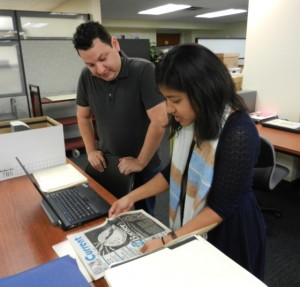
As work ramps up on the organization, arrangement, and description of the recently accessioned Tatcho Mindiola Papers, Hispanic Collections Archivist Lisa Cruces sat down with PhD candidate Carlos L. Cantú to discuss his early impressions this new collection.

Hispanic Collections Archivist Lisa Cruces (right) and Carlos L. Cantú review materials from the Tatcho Mindiola Papers
Lisa Cruces: What made you interested in working with Tatcho’s Collection?
Carlos L. Cantú: As a former CMAS fellowship alumni and supporter of the work Tatcho Mindiola has done for the Mexican American community, on and off campus, it was exciting to hear that he was donating his papers to the Hispanic Collections at UH. He has a long reputation of helping underserved Mexican Americans achieve academic success. When I learned this was the collection to be processed, I thought it was quite an honor to be a part of it. Playing any role, no matter how small, in helping to make his collection available for the community is a true pleasure for me.
Why do you think it’s valuable to make this material accessible?
Because Tatcho has such a long history of political and activist involvement and has touched so many lives in the process – he really has been involved in many aspects of Mexican American struggles – researchers will find a rich collection of sources including rare documents and pamphlets; and extensive materials on the people, events, and organizations he has worked with in large and small roles. Although the collection will provide great insight on Tatcho’s work, his collection will also provide a rich perspective on the roles, experiences, and contributions of the Mexican American community in not only Houston but around the state and nation.
As a historian, what do you find enjoyable about processing work and working in the archives?
The best part is seeing the collection before anyone else does! And the most enjoyable part is seeing how some of my professors dressed and wore their hair in the 1980s and 90s! But at a more serious level, understanding the process and evolution of a collection provides me more appreciation of the work done behind the scenes. Just as historians search for patterns, develop a chronology, conceptualize an argument, and present their ideas, archivists similarly tell a story; however, it is in its most rawest form – it really is a thoughtful process – which I kind of understood, but I had never been a part of before now.
Anything else you would like to add?
It’s great that he donated his collection to UH. He started his academic career here and he retired here. He is well-known on campus, and around the city and state; hopefully this addition of his paper will garner more attention to the new and growing Hispanic Collections.
Carlos L. Cantú is a PhD candidate in the History Department at the University of Houston, currently working on his dissertation. Cantú is an alum graduate-fellow for the Center for Mexican American Studies at the University of Houston. He graduated with a Bachelor’s in History in 2006 and he received his Master’s in History in 2008, both from the University of Texas-Pan American in Edinburg, Texas. His research examines the social history of education for ethnic groups in the U.S., and primarily looks at their struggles to create and shape community-controlled institutions of higher learning during the late 1960s and 1970s. His dissertation is a comparative history of three community-controlled institutions of higher education, Colegio Jacinto Treviño, a Chicana/o college in South Texas, the Navajo Community College in Arizona, and Hostos Community College in New York City. Preliminary research from his dissertation has appeared in published form and presented at academic conferences.